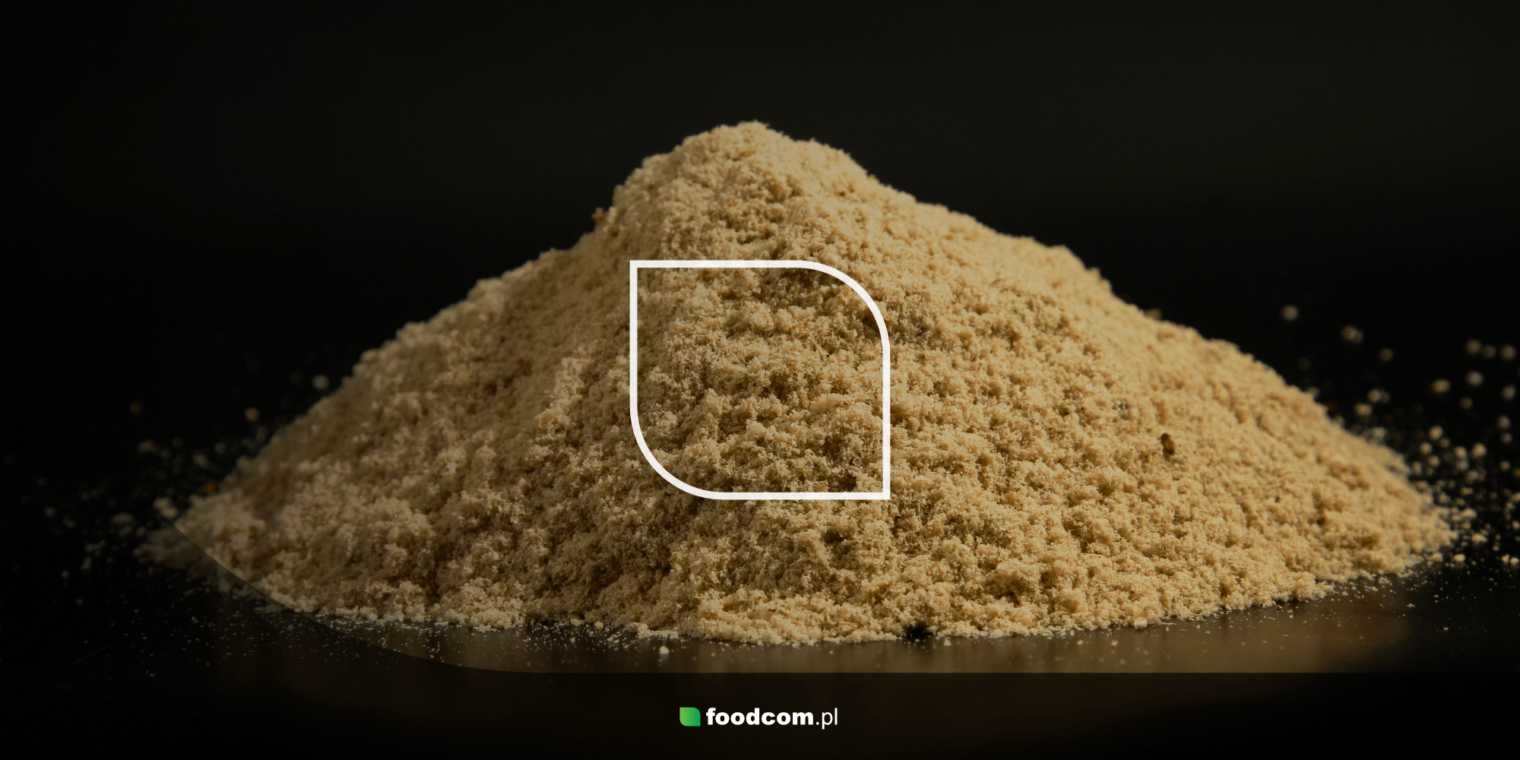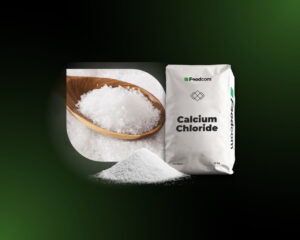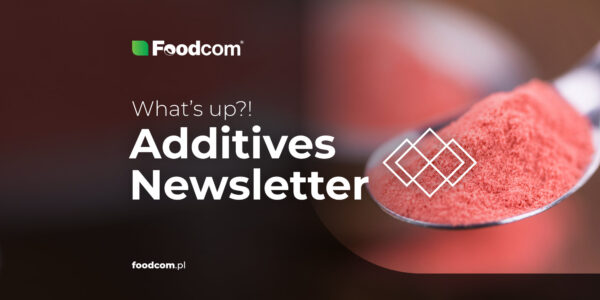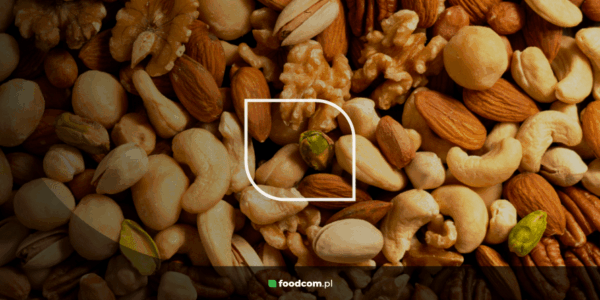Summary
Table of contents
Read our overview of choline chloride – an essential ingredient of animal nutrition. Learn about its production and applications, not limited to feed use. Discover its various benefits in animal nutrition and dive into the projections for market development.
Choline is an organic compound classified as an essential vitamin B4. Industrial choline chloride is produced by the chemical reaction of hydrochloric acid with ethylene oxide and trimethylamine. The final product is available as an aqueous solution or in a powdered form. The latter is obtained by spraying and thoroughly mixing aqueous choline chloride onto a cereal carrier, which is then dried. It is a fine, loose, granular powder with a light brown color and a characteristic smell. Choline chloride is very hygroscopic and highly soluble in water. The product is available in different purity grades expressed in percentage.
Choline chloride is commonly used as a feed additive for farm animals, pets, and exotic animals. Its daily requirement in animal diets is much higher than for other vitamins. Feed supplementation with choline chloride offers a variety of benefits for animal health and performance. Over 40% of choline chloride available on the market is used in poultry feed, while swine and pet feed sectors each owe about 25% of the market share. The remaining part is used in the food industry as a nutrition enhancer and fat-removing agent. Moreover, in the pharmaceutical sector, the product is added to medications used for liver disease, hepatitis, memory loss, dementia, and Huntington’s chorea.
Choline chloride plays a crucial role in several functions within the organism. It builds and reinforces cell membranes, regulates fat metabolism in the liver, supports the nervous system, contributes to methionine formation, and accelerates the synthesis of acetylcholine required for the transmission of the nerve impulses. It is also known to increase fertility, accelerate weight gain, and regulate blood pressure.
Choline supplementation is crucial in young chicks’ diets, as they are unable to synthesize this compound. In the poultry diet, choline is crucial for improving growth rates, enhancing the quality of litter eggs, and preventing diseases such as perosis and hepatic enlargement.
In cow diet, choline chloride is responsible for improving fat metabolism, immune function, fertility, and milk production yield. The product also decreases the risk of fatty liver and ketosis in high-yielding cows.
In swine diets, choline chloride promotes the overall growth rate, improves performance, and enhances meat quality.
In aquaculture, the product accelerates growth rates for fish and shrimps.
In pet nutrition, choline-rich products are recommended for improving brain functionality and liver health as well as for treating symptoms of dementia and senility.
In 2020, the global choline chloride market was estimated to be worth $614.28 million. The Asia-Pacific region dominated the market, owing over 31% share in 2020 and is expected to experience the fastest growth rate of over 5.6% within the next five years. The market development in the region is driven by increased consumption of poultry and eggs that propels production and popularizes choline chloride as a feed additive. The North American region is also growing due to the rising interest in high-quality protein and the surging demand for convenience food. The Middle East and Latin America regions will likely see the increasing interest in choline chloride usage in the oil and gas industries.
Within the next 7 years, the market is projected to grow at a CAGR of 5.3% to $736 million. The market is propelled by increasing worldwide demand for poultry meat and eggs. Additionally, the human nutrition sector is growing at a fast pace owing to health benefits such as improving liver functioning, brain development, and proper metabolism. Nevertheless, the market has been severely constrained by the decline in poultry and swine demand during the COVID-19 pandemic and has to recover the losses. Moreover, limited awareness of the benefits of choline chloride is restraining its popularity.
What is choline chloride?
Choline is an organic compound classified as an essential vitamin B4. Industrial choline chloride is produced by the chemical reaction of hydrochloric acid with ethylene oxide and trimethylamine. The final product is available as an aqueous solution or in a powdered form. The latter is obtained by spraying and thoroughly mixing aqueous choline chloride onto a cereal carrier, which is then dried. It is a fine, loose, granular powder with a light brown color and a characteristic smell. Choline chloride is very hygroscopic and highly soluble in water. The product is available in different purity grades expressed in percentage.
Application
Choline chloride is commonly used as a feed additive for farm animals, pets, and exotic animals. Its daily requirement in animal diets is much higher than for other vitamins. Feed supplementation with choline chloride offers a variety of benefits for animal health and performance. Over 40% of choline chloride available on the market is used in poultry feed, while swine and pet feed sectors each owe about 25% of the market share. The remaining part is used in the food industry as a nutrition enhancer and fat-removing agent. Moreover, in the pharmaceutical sector, the product is added to medications used for liver disease, hepatitis, memory loss, dementia, and Huntington’s chorea.
Benefits in animal nutrition
Choline chloride plays a crucial role in several functions within the organism. It builds and reinforces cell membranes, regulates fat metabolism in the liver, supports the nervous system, contributes to methionine formation, and accelerates the synthesis of acetylcholine required for the transmission of the nerve impulses. It is also known to increase fertility, accelerate weight gain, and regulate blood pressure.
Choline supplementation is crucial in young chicks’ diets, as they are unable to synthesize this compound. In the poultry diet, choline is crucial for improving growth rates, enhancing the quality of litter eggs, and preventing diseases such as perosis and hepatic enlargement.
In cow diet, choline chloride is responsible for improving fat metabolism, immune function, fertility, and milk production yield. The product also decreases the risk of fatty liver and ketosis in high-yielding cows.
In swine diets, choline chloride promotes the overall growth rate, improves performance, and enhances meat quality.
In aquaculture, the product accelerates growth rates for fish and shrimps.
In pet nutrition, choline-rich products are recommended for improving brain functionality and liver health as well as for treating symptoms of dementia and senility.
Market insights
In 2020, the global choline chloride market was estimated to be worth $614.28 million. The Asia-Pacific region dominated the market, owing over 31% share in 2020 and is expected to experience the fastest growth rate of over 5.6% within the next five years. The market development in the region is driven by increased consumption of poultry and eggs that propels production and popularizes choline chloride as a feed additive. The North American region is also growing due to the rising interest in high-quality protein and the surging demand for convenience food. The Middle East and Latin America regions will likely see the increasing interest in choline chloride usage in the oil and gas industries.
Within the next 7 years, the market is projected to grow at a CAGR of 5.3% to $736 million. The market is propelled by increasing worldwide demand for poultry meat and eggs. Additionally, the human nutrition sector is growing at a fast pace owing to health benefits such as improving liver functioning, brain development, and proper metabolism. Nevertheless, the market has been severely constrained by the decline in poultry and swine demand during the COVID-19 pandemic and has to recover the losses. Moreover, limited awareness of the benefits of choline chloride is restraining its popularity.
Categories:









